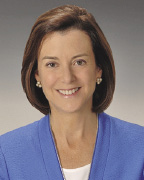Collaboration is the watchword in business today. The whole is greater than the sum of its parts. People get more out of themselves if they work together than if they all worked alone. And before collaboration comes - networking. That is, finding those with whom you can brainstorm, work, create, collaborate, and succeed.
CREW Boston recently brought together the participants from the CREW Boston Mentor Program to hear from a panel of four experienced networkers from CREW Boston, who offered tips and guidance on networking. As president of CREW Boston, I moderated the discussion, which covered working a room, making yourself more memorable, using social media to your advantage, and converting existing relationships into new business.
Panelists were: Kristin Blount, senior vice president and shareholder at Colliers International; Andrea Foster, senior vice president and New England practice leader at PKF Consulting USA, a CBRE Co.; Judy Nitsch, PE, LEED AP BD+C, founding principal and chairman of the board of Nitsch Engineering, Inc.; and Haley Suminski, vice president of Hunt Mortgage Group.
Networking is a take-and-give process, said Blount. Helping someone elicits the desire for that person to reciprocate. She said it is important to be yourself, listen and ask good questions - open-ended ones - and be positive. Bring up a concern, if you want, but don't dwell on it. And reach out - most people at large events feel awkward, and you can put them at ease. Blount noted that 75% of her business "comes from connectors," people who aren't necessarily direct contacts but who were referred to her by her network.
Use LinkedIn to research people you know you will run into and to learn more about them afterwards, counseled Foster. Look at photos on LinkedIn ahead of time to have that visual connection. Sending a follow-up note after any useful meeting can pay off; it can help you be memorable. Use social conversation - current events, weather, sports, family - to break the ice and to break into business subjects. Besides being useful for that, it will show you have broader interests. (Hint: If you're not a sports fan, listen to sports radio for a half hour to pick up highlights.)
If you're alone, said Nitsch, look for someone who is standing alone. She or he is almost always grateful to start a conversation, and each of you has met a new person. Don't stick with the clique you came with. Go introduce yourself as an individual, or invite someone alone to join you if you're in a two-person conversation. Don't go anywhere without business cards, and keep an extra stack in your suitcase, because you'll run out.
If it's a big event with lots of crowds, look ahead at an attendee list, and make a plan to meet someone you know - or whose name you recognize, advised Suminski. Ask others if they know anyone in particular who is in your field whom they would recommend you look for. Remember to smile - you're always more approachable if you do than if you look preoccupied.
Follow up with any promising individuals by uploading business cards - and put something in the Notes section to remind you about the encounter when you come back to it months later. Some people find it's useful to put a date and an event or location on the business cards they collect.
Some of the other tips the panelists offered to make networking easier and more productive might seem obvious, but they're easily overlooked. They include:
Standing up straight, avoiding talking too much or nervous chatter, wearing your name tag on the right (the side you reach to shake hands with), and wearing brighter colors, and mentioning mutual acquaintances if you know of them.
Panelists agreed that networking is relationship building, and it may take several interactions to build a relationship. You should not take it personally if you don't hear back from someone. Be persistent but not annoying.
If you want to develop a business relationship with someone, invite her to join you at an event. Also, be direct; people will respect you if you ask for help.
Finally, if it's a crowd of mostly men, don't feel like you're crashing the party. They won't say it, but they'll welcome the change in the dynamic.
Claudia Piper, senior vice president at Webster Bank, is the 2014-2015 president of CREW Boston, Boston, Mass.
To learn more about CREW Boston and upcoming events visit www.crewboston.org or follow us on Twitter @CREWBoston.
Tags:









